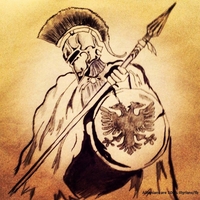0















| Thumbs Up |
| Received: 279 Given: 9 |

I have a questions for you, if you don't mind.
1. Which Baltic languages is more easier to learn: Latvian or Lithuanian?
2. What are the differences and similarities between Latvian and Lithuanian? Are they very similar?
3. Can a Latvian native speaker understand a Lithuanian native speaker without studying?
3. What grammar is more irregular: Latvian or Lithuanian grammar?

Here is a good article about:2. What are the differences and similarities between Latvian and Lithuanian? Are they very similar?
Lithuanian has a free stress in contrast to Latvian fixed stress, which occurs on the first syllable. [Finnic influence which really hardens understanding of Latvian] Latvian is more archaic than Lithuanian in the intonations inherited from Proto-Baltic: the Proto-Baltic circumflex intonation has preserved its falling character in Latvian (it became rising in Lithuanian), and the Proto-Baltic acute intonation retained its rising character (it is falling in Lithuanian), although in some cases (because of stress retraction) it has been changed to the broken intonation; e.g., Latvian pìrsts “finger” = Lithuanian pir̃štas (falling in Latvian and rising in Lithuanian from the Proto-Baltic circumflex), Latvian vãrna “crow” = Lithuanian várna (the rising or extended intonation in Latvian and the falling intonation in Lithuanian from the Proto-Baltic acute intonation), Latvian zâle “grass” = Lithuanian žolė (the Latvian broken intonation from the Proto-Baltic acute intonation through stress retraction).
There are really no differences in the older morphological features between Lithuanian and Latvian if one does not take into account innovations such as the Latvian debitive verb form (man ir jāmācās “I must study” or “it is necessary for me to study”) and the Lithuanian frequentative past (jie eidavo “they used to go”).
Lithuanian and Latvian have two grammatical genders (masculine and feminine) and two numbers (singular and plural), while some Lithuanian dialects also have the dual number. Both Lithuanian and Latvian have seven cases—nominative, genitive, dative, accusative, instrumental, locative, vocative. Standard Lithuanian has five declensions of nouns with 12 inflectional types; Latvian has six declensions with eight inflectional types. Lithuanian adjectives have three declensions, Latvian adjectives have one. The comparison of adjectives in the two languages is different. Both Lithuanian and Latvian have indefinite adjectives (Lithuanian mãžas, masculine, mažà, feminine, “a small one” = Latvian mazs, maza) and definite adjectives (Lithuanian mažàsis, mažóji “the small one” = Latvian mazais, mazā) with their own specific inflection. The verb in Lithuanian and Latvian has three conjugations (genetically different). There are three persons, the third of which is the same (apparently from the time of Proto-Indo-European) in both the singular and the plural (as well as the dual); for example:
http://media-1.web.britannica.com/eb...4-185B5109.jpg
The verb in Lithuanian and Latvian has three tenses (present, preterite [or past], future)—e.g., Lithuanian kertù, Latvian certu (present); Lithuanian kirtaũ, Latvian cirtu (preterite); Lithuanian kir̃siu, Latvian ciršu (future). In contrast to Latvian, Lithuanian also has a frequentative past tense—e.g., kir̃sdavau “I used to cut, strike.” Lithuanian and Latvian have many compound tense forms, compounded from the forms of the verb būti “to be” and participles. There are several moods in both languages, although moods in Lithuanian differ from those in Latvian. The system of participles (active and passive) in Lithuanian and Latvian is quite similar, although complicated—e.g., Lithuanian kertąs, Latvian certuošs (present active); Lithuanian ker̃tamas, Latvian certams (present passive). Lithuanian and Latvian word order is quite free, and, in general, the syntax of both languages is quite similar.
Words are formed in Lithuanian and Latvian basically by means of suffixes, prefixes, and compounding. The languages are very similar in their early vocabulary, and the differences that do occur tend to be more of a semantic nature—e.g., Lithuanian móša “husband’s sister” = Latvian māsa “sister”; Lithuanian žam̃bas “corner, angle (acute)” = Latvian zùobs “tooth.” Some older lexical differences do occur, however (e.g., Lithuanian kraũjas “blood” = Latvian asins; Lithuanian sūnùs “son” = Latvian dēls). In the newer vocabulary, there are now many differences between Lithuanian and Latvian.
http://www.britannica.com/EBchecked/...an-and-Latvian
I think spoken Latvian and Lithuanian are not mutually intelligible. We made and expirement with Waidewut where I tried to translate every word of a Latvian text. I have found Lithuanian equivalents to many Latvian words that did look similar. BUT I got quite vague meaning of the whole text.3. Can a Latvian native speaker understand a Lithuanian native speaker without studying?
Also, there are some Latvian words that are loans that look similar to some Lithuanian words can actually be semantically totally unrelated.
There are of course, several "rules" which knowing that easen the understanding of Latvian but they're totally different languages I must say.

One more opinion, though the last sentences are not necessarily true, it probably suits to the dialects that are firthest from each other.
Apparently when googled "different Latvian Lithuanian" (yeah, I had to do it coz I didn't want to translate long articles full of various terms I don't know well), I saw this article. I think It answers your first question quite well:Latvian is the only living language with sounds and endings similar to those of Lithuanian, but a Latvian and a Lithuanian who do not speak each other's tongue cannot communicate, unlike a Dane who can communicate with a Norwegian, an Italian who can communicate with a Spaniard, or a Ukrainian who can communicate with a Russian. A Lithuanian and a Latvian can only recognise a few words in each other's speech, and this is not enough to hold a conversation. Therefore, we can say that Lithuanian is a language that cannot be understood by a speaker of any other language who has not learnt it. More than that, even users of different Lithuanian dialects (such as Samogitians and Aukštaitians) cannot understand each other unless they communicate in standard Lithuanian, which they, have to learn.
http://ikindalikelanguages.com/blog/...an-lithuanian/
Latvian is Easier Than Lithuanian:
- Easier stress
- Less conjugation
- Less inflection
- Simpler gender identification
- Simpler preposition usage
- More links to Russian













| Thumbs Up |
| Received: 279 Given: 9 |

Thanks for useful posts.














| Thumbs Up |
| Received: 3 Given: 0 |

Paldies!! A very good explanation. I've been interested in Latvian since I visited Riga this last winter. I have read that Lithuanian is the closest to proto-european.
Last edited by MST3K; 08-19-2012 at 02:34 AM.















| Thumbs Up |
| Received: 2,387 Given: 2,630 |

professor mordid













| Thumbs Up |
| Received: 1,226 Given: 92 |

I don't know, probably Latvian, though I don't think that the difference is so huge. Every language is hard to learn imo and the older you are the harder it is to learn a new language. Latvians don't understand Lithuanian and Lithuanians don't understand Latvian so knowing one Baltic language doesn't mean that you will understand the other, how it is with, for example, Swedish and Norwegian. I usually wonder why we really don't understand each other. There are only two living Baltic languages and we live next to each other in such small region... it's a bit weird, but interesting imo.
As Human_master said - they are totally different languages, both also have different foreign influences, ect. But yes, her post describes them both really well.
But determining which is easier to learn is really individual, for some reasons some would find Latvian easier, while others - Lithuanian.
Here is a list of words and phrases that I know in LT:
Labas dienas/Labas vakars
kambaris;
ačiū;
žibintuvėlis;
valstybės;
agurkas;
duona...And I usually know a bit more than the average Latvian.






| Thumbs Up |
| Received: 14 Given: 0 |

estonian for me
Mina olen Snug, on Eestlane
Last edited by PeacefulCaribbeanDutch; 08-23-2012 at 05:56 AM.













| Thumbs Up |
| Received: 279 Given: 9 |
There are currently 1 users browsing this thread. (0 members and 1 guests)
Bookmarks